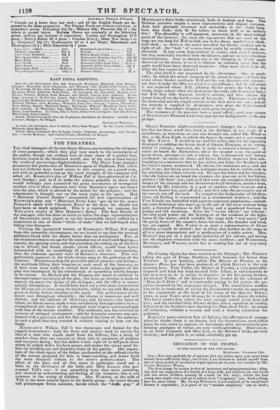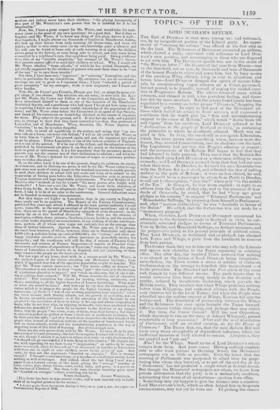EDUCATION OF THE PEOPLE. TO THE EDITOR OF THE SPECTATOR.
Manchester, November 13th.
SIR-You may probably be of opinion, that my claims upon your space have already been sufficiently large ; but if not, I am desirous to defend myself from two or three points of accusation urged against me in your last number by Mr. JAMES RIDDALL WOOD.
The first charge he makes, is that of ignorance and misrepresentation ; alleging, that my supposition of a family of a man, wife, and children, the two heads and two senior children earning 21. a week (or 10s. each), whilst the four Iyoung ones might very well go to school, is an " imaginary " one. Such a thing, says he, never exists. Mr. JAMES WHEELER is not married, or lie would have known it impossible; ,it is proof of my "amiable simplicity," and so fotth ; mothers and fathers never leave their children : " the glaring incongruity uf tha part of Mr. WHEELER'S case proves that he s indebted for it to his imaaination." R i
Now, Sir, I have a great respect for Mr. Woon, and would take his testi
ninny (even to the proof of my own ignorance) for a good deal. But it does so happen—and Mr. Wool), if he know any thing of this place, knows it well— that hundreds, I might almost say thousands of families in Manchester, habitu. ally lock up their houses from early morning till dinner-time, and some till night ; so that in very many cases (as my own knowledge goes) a labourer and his wife can be fonnd at home only at early morning or at night, the children either going to the factory., or some being sent to school, and very many being aammitted to a neighbour's care, that neighbour being paid. Strong confirmation, this, of my " amiable simplicity," but stronger of Mr. Woon's theory, that parents cannot afford to send their children to school. Why, I would ask Mr. Worm whether." dame schools," of which he has visited thousands, are not chiefly supported by the children of parents who send them there to be " out of the way " or to save them trouble ?
Rot then, I have been very "ingenious" in " selecting" Lancashire, and this
tOWII in particular, for my calculations. My estimates, too, are all overdrawn; earnings arc not so great as I represent them ; I have "selected a period of great prosperity " for my averages ; trade is now stagnated ; and I know not what herades.
Now, Sir, der ewsori quer Ciesaris, Deoque elute Dei ; or adopt the more vulgar adage, if you choose. The selection was not mine; it rests with Dr. KAY and Mr. WOOD, the Castor and Pollux of the Committee on Education. Dr. Kay introduced himself to them as one of the founders of the Manchester Statistical Society, and a gentleman who had spent I know not how many years in acquiring I know not how ranch (useful) knowledge of the population of the town ; and Mr. WOOD came before the Committee as an agent of that Society, and based all his statements on knowledge obtained in the course of inquiries for them. They selected the ground, not I. It was but my task, and a painful one, to attempt to show that they knew somewhat less than they professed of Lancashire and of Manchester. When, therefore, Mr. Wool) imputes the "selection" to me, he is rather forgetful. But still, to avoid all squabbling in the matter, and seeing that "an two rnen tide on a horse, one must ride behind," I will so far yield to Mr. W000 as to leave him to " select " his ground again, and put the argument into what shape he pleases. Either Lancashire is one of the richest counties of England, or it is one of the poorest. If it be one of the richest, and the education returns published by Government yet place it (as they do) nearly at the bottom of the scale in point of information, it is a fair argument that the pecuniary means of parrots was not the correct test of their inclination to educate ; and what becomes of Mr. W000's demand for an increase of wages as a necessary preliminary to widen education ? It, on the other hand, it be one of the poorest, despite its railways, its canals, its commerce, and its thriving seaports, it will be for Mr. WOOD either to suggest some new mode of raising wages to the standard necessary to enable parents to send their children to school with new coats and hats, or to submit to the imputation of having gone before the Education Committee only to propound Utopian doctrines and urge improbable achievements. Was that Knight of La lilanclia who " mistook an inn for a castle" the same person who fought with windmills? I have not a wit like Mr. Woon, and know little, therefore, of these funny books. As to the allegement, that "trade is now stagnated," and so forth, I take it to be of no value in the controversy. General deductions must not he founded on temporary circumstances. But that wages are higher in Lancashire than in any county in England, there surely can be no querion. The Report of the Factory Commissioners, published five years ago, which I adduced as the least partial authority I could quote, states las. as the average earnings of all factory operatives; and of this clue:, there are in the parish of Manchester upwards of sixty thousand; in the county far on to two hundred thousand. Then there are the swarms of mechanics, colliers, dyers, printers, bleachers, joiners, builders, and the number. less other trades dependent on manufacture, to say nothing of clerks, warehousemen, porters, all of whom earn wages not certainly less on the average than those of factory labourers. Against these, Mr. Wool, may set, if he pleases, the hand•loom weavers, of whom, however, there are in Manchester ODIV about 4,000 (the population being upwards of '2.00,000), the "ostlers," and other unhappy creatures ejusdenr gtneris, whose ignorance so powerfully excites his sympathy ; and the conclusion will still be, that if reports of Factory Commissioners and returns of Factory Inspectors—if reports of Poor.law Commissioners—if returns of expenditure of Poor-rate, mean any thing, the population of Lancashire is the best to do in England, and yet (according to these same returns) the people are the least educated. The last topic of my letter, dealt with in a serious mood by Mr. Woon, is the analysis I gave of the classes attending our Mechanics Institute; limn which it appeared that few of the operative population sought its benefits. The fact Mr. ‘VOOD cannot controvert; but "few words suffice to dismiss" it. The education is not suited to their '• taste," anti " this taste it is the business Of a judicious education to impart," and "such an eilticatton few of our working population have enjoyed." Will Mr. Wool) describe the sort of education needed ? This institution has classes for reading, writing, arithmetic, and thence ascending to all the higher branches of human knowledge. What more or what else would he have? AIRI how can he say that the elementary edit. cation which is to prepare the people for the higher learning ot a mechanics institution, (ye Gods !) "few of our winking population have enjoyed ;" a hen the town swarms with Sunday schools, not the growth of yesterday, nor, as he knows, incapably conducted ; or, if the education of this Institute be not adapted to the necessities of those to whom it behings and whose designation it bears, why do not they who, by enjoying its benefits have been awakened to its deficiencies, remodel it ? I recur for an answer to the docttine of my former letter, that the people " ate wiser, many of them, than their betters; but theits is education picked up neither at dame sehools nor at mechanics institutes, but by their own fire sides," arid they would show themselves the best friends of the people who, instead of collecting statistic: of the number of benches and birch. rods in dame schools, would put the manufacturing population in the way of acquiring more of this hind of learning. But of this enough now. These are the only points dealt with by Mr. Wow). lie runs off, to be sure, into a vein of wit and pleasantry ; but into those regions !cannot follcw him : I am no wit, though I admire it so much in others, that truly (as saith the dramatist) "it should not go unrewarded if I were King in this count, y." He charges me, too, with appealing for lily facts to my " innigination ;" an audio, my he seems never to consult, albeit he 'iota tell us "of thousands of families in Lancashire with from one to eight or nine children nailer twelve years of age. And lastly, he does not like arguments "founded on averages." This is strange enough !. I thought a cortomerchant, or a member of a statistical society, loved nothing so well as averages. Anti indeed, about the last thing I read was a paper from a learned society of this kind, giving the " avelage " number of cows, calves, pigs, sheep, horses, carts, cocks, hens, and geese, in a parish on the borders of Cheshire. But then, to be sure, theories touching geese must be "founded on averages "—there is nothing else for it. Yours obediently, JAMES WHEFLER. [This letter has been in type several weeks, and is now inserted wily in fulfilment of an implied promise to the writer.] • I do not quote these documents, fearing to trespi se on sours ace; the i aper: are Parliamentary Reports of 1835.



























 Previous page
Previous page